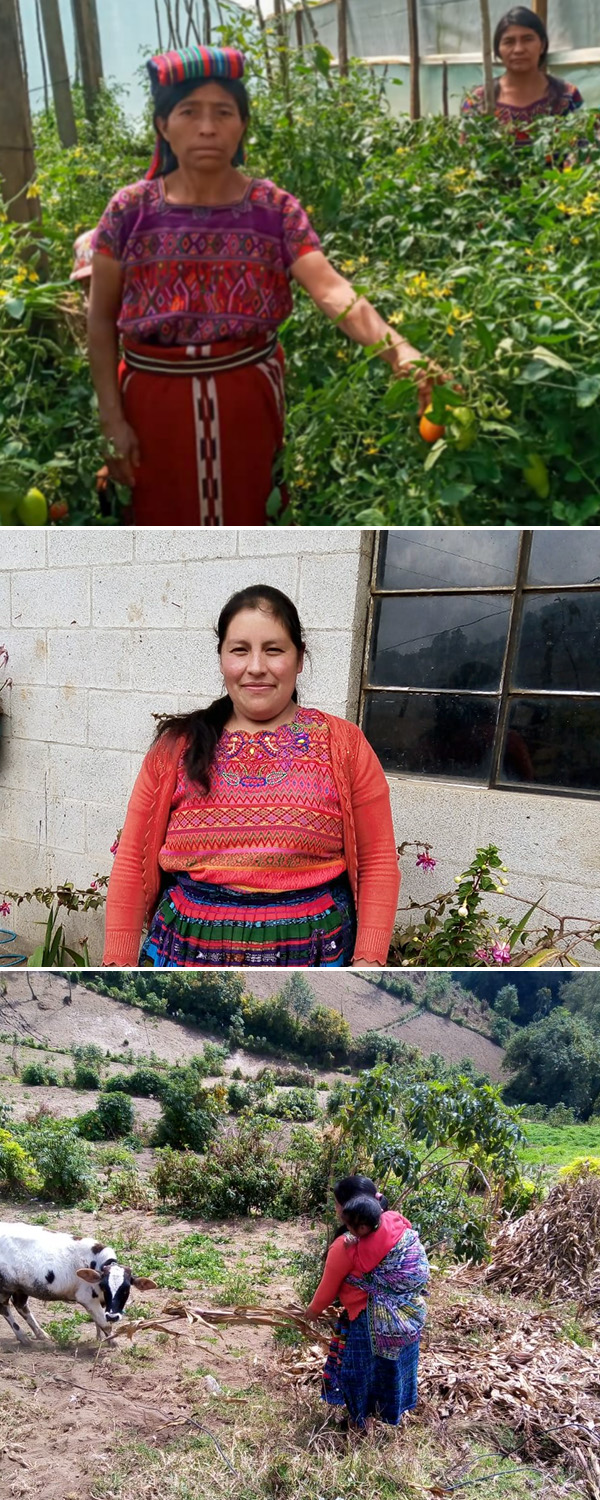Stories of Change

Top: Josefa in her group's greenhouse. Middle: Rosa. Bottom: Rosa in her field with Alexa on her back.
Josefa and Rosa’s Initiative Helps 490 Families
Before the sun has shown its first rays of the day in la Pista village, Josefa Pérez is already awake praying. “I ask for the harvest to increase, that this year we have more crops,” says Josefa. That’s why the first thing she does after preparing breakfast and cleaning the house is see her crops of peas, cabbage, broccoli and potatoes.
Like other women from her village in Guatemala, Josefa works hard and spends most of her time in the garden taking care of the vegetable production. This feeds her family and allows them to sell their produce at the local farmers market, where other small producers like her sell.
The CWS program called Seeds of Hope for Food Security and Nutrition Project, implemented by our local partner CIEDEG, includes 490 families like Josefa’s. Families also receive various other materials used to care for their crops.
The program is also developed in San Martín Sacatepéquez and San Juan Ostuncalco, in the department of Quetzaltenango. The participants receive seeds to plant in their gardens and greenhouses. Some of them also accessed training on issues such as human rights, women’s rights, food safety and hygiene.
Mountains surround la Pista village, and although usually it’s cold, these first days of the year have been warm, with little rain. Despite the weather, Josefa and four other women go to work in their typical outfits of the Maya Ixil ethnic group. They wear long skirts called ‘cortes‘ and wide blouses called ‘huipiles‘. These are made of cotton, covered with flowers, animals, and symbols that reflect their communities in bright colors. “We are happy. It has been a good harvest. In the greenhouse, we have tomatoes, jalapeño peppers, bell peppers and cucumbers,” Josefa says.
About 80 miles from Nebaj, CIEDEG is also implementing the project in six villages. These villages include: Toj Mech, El Rincón, La Estancia and Toj Alik, and Nueva Concepción and Agua Blanca.
In Nueva Concepción, we talked to Rosa Elvira Vásquez, who cares for her animals and crops while carrying her 18-month-old daughter Alexa on her back. She is the youngest of their four daughters. Rosa’s family received a pig two years ago, and thanks to the support of CWS and LDS Charities, now they have three. She also received seeds and planted corn, potatoes, cilantro, beets, radishes and carrots.
The pass production chain is another initiative in San Martín Sacatepéquez and San Juan Ostuncalco. It consists of several families receiving animals such as pigs, chickens and sheep. When the animals reproduce, they are distributed to more families to start their breeding and sale process.
The resources from this activity help them buy other food, medicine, clothes, and school supplies for their children. “I have learned a lot, what we collect in the orchards is used to prepare lunch and meals,” Rosa says. Despite not having the opportunity to study, Rosa’s daughters have already entered school.
In the next stage, the project will offer workshops on food safety and agricultural techniques. There will also be height and weight measurements of children under five to determine their nutritional states.
